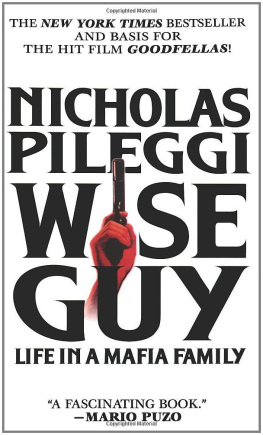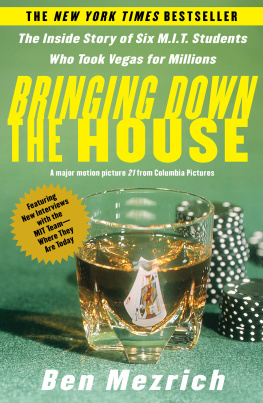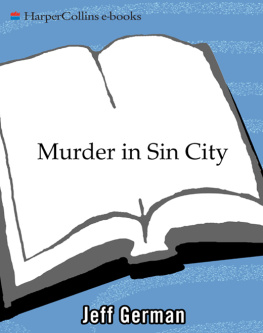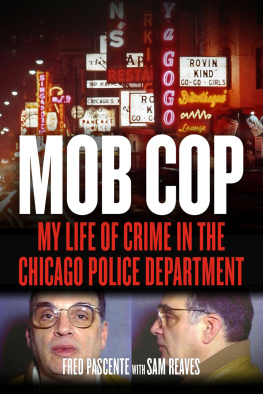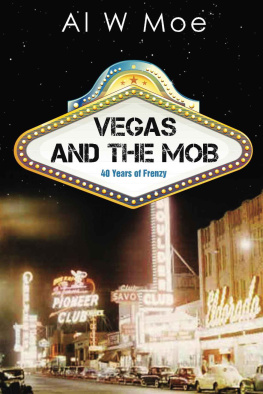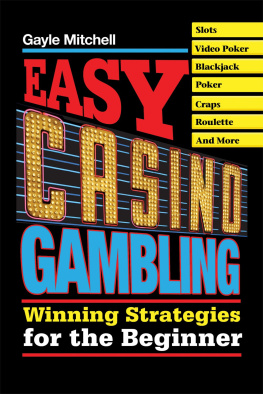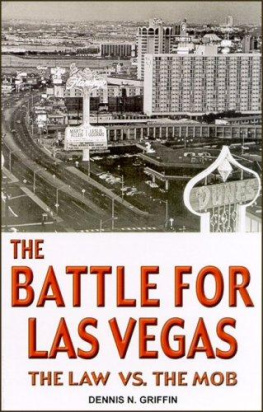Casino
Love and Honor in Las Vegas
Nicholas Pileggi

For Nora
Acknowledgments
I would like to acknowledge my appreciation and gratitude for the hundreds of people who helped me with this book, but I also wish to extend a special thanks to Gene Strohlein, Mert Wilbur, Dennis Arnoldy, Jack Tobin, Joseph Gersky, Murray Ehrenberg, Wally Gordon, Oscar Goodman, Emmett Michaels, Mike Simon, William Ouseley, Bud Hall, Bo Dietl, Beecher Avants, Jeffrey Silver, Marty Jacobs, Mike Reynolds, Jeff German, Ed Becker, A. D. Hopkins, Jim Neff, Phil Hannifin, Shannon Bybee, Lem Banker, Dick Odessky, Allen Glick, Matt Marcus, Richard Crane, Loren Steven, Russ Childers, Jack Roberts, Brian and Myra Greenspun, Angela Rich, Manny Cortez, Douglas Owens, Frank Cullotta, Ray LeNobel, Melissa Prophet, Lowell Bergman, Tommy Scalfaro, Tim Heider, Scott Malone, Ellen Lewis, Kristina Rebelo, Joey Boston, George Hartman, Bobby Kay, Bill Bastone, Kenny Brown, Bob Vanucci, Claudette Miller, Victor Gregor, Arlyne Brickman, John Manca, Buddy Clark, Joe Coffey, Don Furey, Joe Spinelli, Phil Taylor, Rosalie DiBlasio, Howard Schwartz, Bob Stoldal, Lee Rich, Shirley Strohlein, and, of course, Frank Rosenthal.
About the Author
Nicholas Pileggi (b. 1933) began his career as a crime reporter for the Associated Press and New York magazine. He found fame when his familiarity with the members and workings of the Mafia led to his two bestselling nonfiction volumes about organized crime, Wiseguy: Life in a Mafia Family and Casino: Love and Honor in Las Vegas, both of which were adapted into award-winning films directed by Martin Scorsese. Pileggi is also involved in film and television. He served as an executive producer for the Ridley Scott film American Gangster and cowrote the pilot for the CBS TV show Vegas. In 1990, he won a BAFTA Award for Best Adapted Screenplay for his work on Goodfellas.
Introduction
Why is my car on fire?
I had just had dinner and gotten in my car, said Frank Rosenthal. I dont remember whether or not I turned on the ignition, but the next thing I saw were these little flames. They were only about two or three inches high. They were coming out of the defroster vents. I never heard any noise. I just saw the flames reflected against the windshield. I remember, I asked myself, Why is my car on fire? And then the flames started getting bigger.
There must have been a strong enough jolt to throw me against the steering wheel, because it hurt my ribs, but I dont remember any of that. All I thought was that my car was having some kind of mechanical problem.
I didnt panic. I knew I had to get out of the car. I had to get away from the flames. Call the garage. I reached for the door handle. I almost torched my arm. There were flames shooting up between the seat and the door. Now I knew I had to get out of the car or Id never see my kids again. This time I used my right hand to grab the door handle, and I threw my shoulder against the door at the same time. It worked.
I fell out onto the ground. There were flames all around me. Some of my clothes were on fire. I was burning. I rolled around on the ground until the flames were out.
Two men helped me to my feet and got me about twenty or thirty feet from the car. They told me to get down, but I didnt want to. I kept saying that I was all right. They insisted I get down, and when I did, it was as though the atom bomb had gone off. I saw my car jump about two feet into the air, and then flames shot up through the roof about two stories high.
Thats when I realized for the first time it hadnt been an accident. Thats when I knew somebody put a bomb in my car.
Before his car was blown up outside Marie Callenders Restaurant on East Sahara Avenue on October 4, 1982, Frank Lefty Rosenthal had been one of the most powerful and controversial men in Las Vegas. He was in charge of the largest casino operation in Nevada. He was famous for being the man who had brought sports bookbetting to Vegasan achievement that made him a true visionary in the annals of local history. He was a gamblers gambler, the man who set the odds, a perfectionist who had once astonished the kitchen help in the Stardust Hotel by insisting that every blueberry muffin had to have at least ten blueberries in it.
But Frank Rosenthal had been dodging trouble most of his life. He started as a clerk and bookie for Chicago gamblers and mobsters before he was old enough to vote. In fact, before going to work inside the casinos in 1971, Lefty had held only one legitimate jobas a military policeman in Korea between 1956 and 1958. In 1961, when he appeared at the age of thirty-one before a congressional committee in Washington investigating the influence of organized crime on gambling, he took the Fifth Amendment thirty-seven times. He wouldnt even tell them whether he was left-handedwhich fact, by the way, had earned him his nickname. A few years later he pleaded nolo contendere to bribing a college basketball player in North Carolinathough he never admitted his guilt. In Florida, he was banned from horse and dog tracks for allegedly bribing the Miami Beach police. And in 1969, along with a dozen of the nations biggest bookmakers, he was indicted by the Justice Department in an interstate gambling and racketeering conspiracy case that dragged on for several yearsuntil Leftys lawyer got the indictment thrown out because John Mitchell, the attorney general at the time, had failed to personally sign the cases wiretap orders, as required by law. Mitchell had been out on a golf course the day the court orders were to have been signed and had instructed an aide to forge his name.
Frank Rosenthal came to Las Vegas in 1968 for the same reason so many other Americans haveto get away from his past. Las Vegas was a city with no memory. It was the place you went for a second chance. It was the American city where people went after the divorce, after the bankruptcy, even after a short stint in the county jail. It was the final destination for those willing to drive halfway across America in search of the nations only morality car wash.
It was also the city where you could strike it richa kind of money-happy Lourdes where pilgrims got to hang up their psychic crutches and start life anew. It was the end of the rainbowAmerican city as pot of goldthe only place in the country where the average guy had a shot at a miracle. Long odds? Sure, but for many of those who went to live in Las Vegas and for many who went to visit, the longest odds in Las Vegas were better than the odds they had been dealt in their lives back home.
It was a magical place, the neon capital of the world. By the 1970s, the stigma of its mobster history was on the wane, and there seemed almost no limit to its potential for growth. Bugsy Siegel, after all, had died way back in 1947. And he wasnt even killed in Las Vegas. He was shot dead in what is now the 90210 zip codeBeverly Hills.
By the 1970s, Las Vegas was poised for such unprecedented growth that the city was much too big to be dominated, or even influenced, by a bunch of men with funny accents and pinky rings. Public corporations like Sheraton, Hilton, and MGM, along with Wall Street investment bankers and Michael Milkens Drexel Burnham Lambert, were becoming increasingly interested; tentative investments had already begun to turn what was essentially an inhospitable, crop-defying, windblown, alkaline-salted town on the eastern end of the Mojave Desert into the fastest-growing city in the United States. From 1970 to 1980, Las Vegas would double the number of its visitors, to 11,041,524, and the amount of cash left behind by those visitors would increase 273.6 percent, to $4.7 billion. The heart of all this growth was, of course, the casino businessand by 1993 visitors had dropped $15.1 billion in town.

![Pileggi Casino [eBook - NC Digital Library]: Love and Honor in Las Vegas](/uploads/posts/book/227422/thumbs/pileggi-casino-ebook-nc-digital-library-love.jpg)
